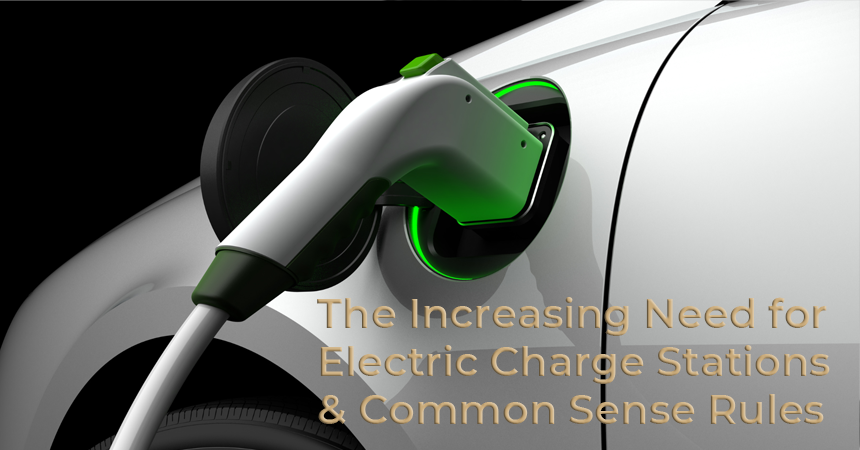By: Melissa S. Doolan, Esq.
From 2020 to 2021, the sales of electric vehicles doubled.[1] As gas prices continue to hit record highs, more people are turning their eyes towards an electric vehicle. With the rise in popularity of electric vehicles, community associations must address owners and residents’ ability to charge them.
Washington recently joined California and several other states by enacting laws that bar associations from adopting or enforcing any rule that prohibits the installation and use of an electric vehicle charging station. Arizona already requires planned communities to allow the installation and use of solar energy devices. See A.R.S. §33-1816(A) and §33-439. Arizona’s adoption of a statute to require associations to allow the installation and use of electric charging stations is a real possibility.
There are practical and logistical concerns for an association when adopting rules to allow the installation of electrical charging stations. The concerns in a condominium or townhouse community are abundant. Planning for installation, operation, maintenance, repairs, insurance and costs are paramount.
The first concern is whether the current electrical system for the association can meet the power needs of charging stations. The association’s electrical system may need a complete overhaul to safely handle the needed electricity. The association will need to address the costs involved.
There are costs for potentially upgrading the electrical system of the association, installing the charging stations, and ongoing maintenance. Not all owners will use the charging stations, so the question is whether it is fair to charge all owners for the costs of the charging stations. The cost also includes the electricity. The association must consider how to allocate costs of individual usage of the charging station. Will the association pay the bill and then allocate the costs equally among those with electric vehicles, will each electric vehicle owner and resident be required to set up an account to receive an invoice for their usage, or will the user of the electric charging station pay prior to using the charging station?
Also, the association must address the time allowed for use of the charging stations by residents. If there are two charging stations and five electric vehicles, then the association will undoubtedly have disputes over the usage of the charging stations. The association should adopt rules regarding how an electric vehicle owner uses a station, such as a first come, first serve basis or a maximum duration per day system.
Finally, the association must ensure it has the correct insurance coverage. The number one hazard of charging station is the risk of fire, usually caused by not having the correct electrical system for the station installed. However, there are other risks, such as the trip hazard from the charging cord that the association must take into account when it obtains insurance.
Taking a proactive approach to electrical charging stations is necessary given the rise in the popularly of electric vehicles. First, an association’s board should consider a survey the community to gauge interest in installing charging stations. If residents signal their desire or need for such charging stations, then work with a licensed contractor to determine whether the association’s electrical grid can meet the needs of charging stations and the best location to install the stations. Next, the association should verify and/or obtain the necessary insurance. Finally, the board should work with the residents to determine the rules for using the charging stations. Don’t forget to address who will pay for the costs for the installation, use, and maintenance of the charging stations.
Mark Twain said, “The secret to getting ahead is getting started.” Start planning for the installation, operation, maintenance and costs electric charging stations in your communities as the use of the electric vehicle will only continue to rise.
The information provided herein is for reference purposes only, is general in nature, and is not intended as legal advice. For specific questions or legal issues regarding your association, please contact us at 480-219-3633.
[1] “Electric Cars Fend Off Supply Challenges to More than Double Sales” by Leonardo Paoli and Timur Gul dated January 30, 2022 published by the International Energy Agency.

